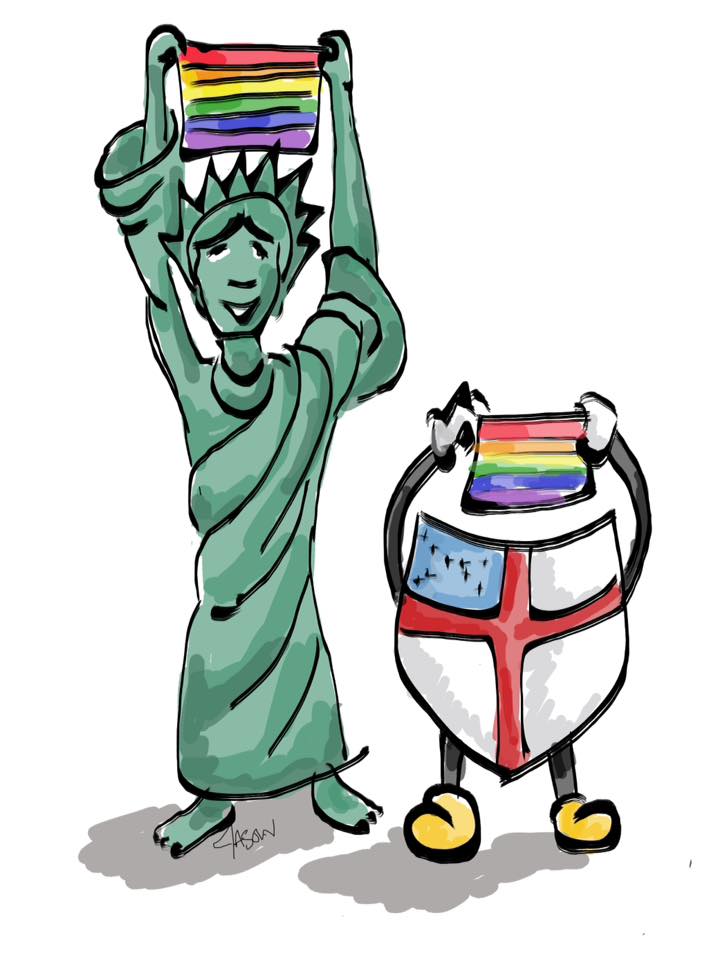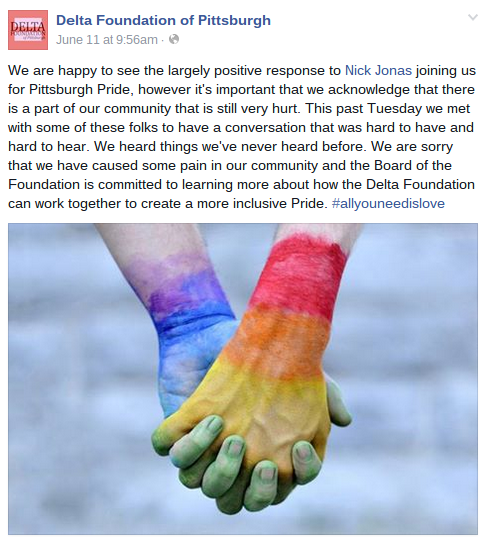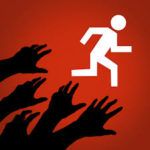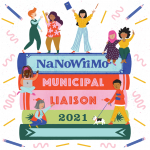Today marks the 47th anniversary of the Stonewall Riots, which launched the LGBT-rights movement.
If you’re not familiar with the riots, here’s what happened:
And just this week, President Obama and the National Park Service has named the Stonewall Inn and Christopher Park a national historical monument (number 412 if you can believe it). We owe so much to those brave trans-women of color, homeless youth and drag queens who launched the riots and the queer revolution.
People ask why we celebrate pride. NoFo writes it much more eloquently than I ever could, here is an excerpt:
We’re proud because despite relentless persecution everywhere we turn—when organized religion viciously attacks and censures and vilifies us in the name of selective morality, when our families disown us, when our elected officials bargain away our equality for hate votes, when entire states codify our families into second-class citizenship, when our employers fire us, when our landlords evict us, when our police harass us, when our neighbors and colleagues and fellow citizens openly insult and condemn and mock and berate and even beat and kill us—we continue to survive.
…
We’re proud because—thanks to the incredible bravery shown by gay people who lived their lives openly in the decades before us—we can live our lives more and more openly at home, at work, with our families, on our blogs … and even on national television.
…
We’re proud because after all we’ve been through, the world is starting to notice and respect us and emulate the often fabulous culture we’ve assembled from the common struggles and glorious diversity of our disparate lives.
We’re proud because this weekend we’ll celebrate with drag queens, leather queens, muscle queens, attitude queens and you’d-never-know-they-were-queens queens, and together we can see through the “pride” in our parade and enjoy the underlying Pride in our parade.
Quite simply, we’re proud that we have so much to be proud of.
We can take some time, and even in the face of hatred, bigotry and discrimination, we can carve a place in this world, claim it our own and celebrate.
We can celebrate, because this is our party. We don’t need anyone’s permission to celebrate:
Because even if Pride doesn’t change many minds in the outside world, it’s our PARTY, darlings. It’s our Christmas, our New Year’s, our Carnival. It’s the one day of the year that all the crazy contingents of the gay world actually come face to face on the street and blow each other air kisses. And wish each other “Happy Pride!” Saying “Happy Pride!” is really just a shorter, easier way of saying “Congratulations on not being driven completely batshit insane! Well done, being YOURSELF!”
We can celebrate the community that we have, the radical acceptance that we embody and the fact that we’ve survived. We have a chance to come together, remind ourselves we belong to a larger community, have some fun and take back our city; just for a little bit. We know that hatred will continue, but still we march forward. We have pride because it helps those coming after us. In the words of Harvey Milk, it gives the next generation hope:
https://www.youtube.com/watch?v=fWo8BKJCxYQ
And this is a chance to celebrate the fact that I’ve survived. A chance to celebrate the fact that I’m a proud gay man. And even that act, powerful unto itself, has hopefully made a difference.
The most important and powerful action a person can make is to come out to those around them. Then the LGBT community isn’t a scary abstract anymore, it has a face. If you know someone who is openly LGBT, you see their humanity. You can understand that we’re not asking for anything special, just the same rights everyone else is guaranteed by the constitution. A chance to be happy. A chance to live the life we want, surrounded by those we love.
When will we stop talking about coming out?
“Many of us want to, and will: when a gay, lesbian or transgendered kid isn’t at special risk of being brutalized or committing suicide.
…
“When a gay person’s central-casting earnestness and eloquence aren’t noted with excitement and relief, because his or her sexual orientation needn’t be accompanied by a litany of virtues and accomplishments in order for bigotry to be toppled and a negative reaction to be overcome.”
We will stop talking about coming out when it’s not news anymore, when the last barriers have finally been broken down. We’ll stop screaming for our rights when we’re finally treated as equals by our government. We’ll only stop telling our stories when they don’t matter.
The anniversary of Stonewall comes just two days after marriage equality came to all 50 states (and the anniversary of decisions in Lawrence v. Texas and Windsor v. United States), a major piece of the equality dream the drag queens, homeless youth and the rest of Stonewall protesters had less than 50 years ago. In 11 years, we’ve gone from no marriage rights to full equality across the country. We still have a lot to fight for, ENDA being at the top of that list, but for now, we can celebrate the ‘thunderbolt’ of equality that we have achieved:
So we keep fighting for progress, wherever we can. We celebrate our advances and keep chipping away at our obstacles: and this month we can celebrate both, as well as the individuals that make up our amazing community.
In light of the Orlando massacre, it’s more important than ever to celebrate Pride. To not be intimidated by the hate, but to instead keep rising, demand equality and fight for our very right to exist. What hurts the most about Orlando may be the reminder that even our own spaces, which we thought were safe, aren’t. Or maybe they never really were, not while hatred and prejudice still exist. But as we face, united, the epidemics of gun violence and homophobia, we can at least take solace in the fact that we, as a community, know how to win epidemics.
We’re proud of how far we’ve come. We’re proud to keep fighting. We’re proud.











